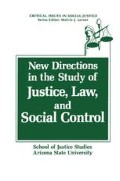Abstract
In the United States, discourse on law and order are often juxtaposed to discourse on social justice. Indeed, throughout American history, corrective justice (as with punishment) has often been found in opposition to distributive justice (as when all individuals get their fair share in life). Proponents of corrective justice call for law and order to prevent disruption of the social order, while opponents look to social justice as the means for creating a more orderly social system. Some have explained the disagreements over order and justice as rooted in the pluralistic nature of American society (Pound, 1906). Others have argued that what you see depends upon where you sit (Black, 1976; Chambliss, 1982; Nader, 1986). Whatever the origin of the dis-sensus, debates about order are really debates about justice. However, it may be that discourse centered on law and order or social justice does little more than sustain the status quo, while discussion of injustice would force an examination of concrete events rather than abstract ideals and interrupt the oscillation between government programs to cure law and order problems and government programs to address questions of social injustice. The central question of this chapter is a conceptual one—what type of discourse would work to produce needed social transformations.
Access this chapter
Tax calculation will be finalised at checkout
Purchases are for personal use only
Preview
Unable to display preview. Download preview PDF.
References
Abel, R. (Ed.) (1982). The politics of informal justice, Vol. l. The American experience. New York: Academic Press.
Bellah, R., Madsen, R., Sullivan, W. M., Swidler, A., & Tipton, S. M. (1984). Habits of the heart. Berkeley: University of California Press.
Best, A., & Andreason, A. R. (1977). Consumer responses to unsatisfactory purchases: A survey of perceiving defects, voicing complaints and obtaining redress. Law and Society Review, 11, 701–742.
Black, D. (1976). The behavior of law. New York: Academic Press.
Burger, W. E. (1984). The state of justice. American Bar Association Journal, 70 (April).
Cahn, E. (1964). The sense of injustice. Bloomington: Indiana University Press.
Chambliss, W. J. (1982). Toward a radical criminology. In D. Kairys (Ed.), The politics of law. New York: Pantheon.
Claeson, B. (1986). The privatization of justice: An ethnography of control. Honors thesis, University of California, Berkeley.
Dumont, L. (1977). From Mande vil le to Marx. Chicago: Chicago University Press.
Friedman, L. M. (1975). The legal system: A social science perspective. New York: Russell Sage Foundation.
Koch, K.-F. (1974) War and peace in JaJemo: The management of conflict in highland New Guinea. Cambridge, MA: Harvard University Press.
Koch, K.-F. (1978). Pigs and politics in the New Guinea highlands: Conflict escalation among the Jale. In L. Nader & H. L. Todd (Eds.), The disputing process (pp. 41–58). New York: Columbia University Press.
Kroeber, A. L. (1917). Zuni Kin and clan. In Anthropological papers, XVIII. New York: American Museum of Natural History.
Li, V. (1977). Law without lawyers: A comparative view of law in China and the United States. Stanford Alumni Association, pp. 1–103.
Lockridge, K. (1970). A New England town: The first hundred years. New York: Norton.
Malinowski, B. (1926). Crime and custom in savage society. London: Routledge.
Nader, L. (1964). Talea and Juquila: A comparison of Zapotec social organization. University of California Publications in American Archaeology and Ethnology, 48(3), 195–296.
Nader, L. (1974). Perspectives on the law and order problem. In M. Lerner & M. Ross (Eds.), The quest for justice: Myth, reality, ideal (pp. 65–81). Toronto: Holt, Rinehart & Winston of Canada.
Nader, L. (1979). Disputing without the force of law. Yale Law Journal, 88(Special Issue on Dispute Resolution), 998–1021.
Nader, L. (1980). No access to law. New York: Academic Press.
Nader, L. (1984a). From disputing to complaining. In D. Black (Ed.), Toward a general theory of social control (pp. 71–94). New York: Academic Press.
Nader, L. (1984b). A user theory of law. Southwestern Law Review, 38(4), 951–963.
Nader, L. (1986). Enforcement strategies and the catch they yield at the SEC. Harvard Law Review, 99(6), 1362–1373.
Nader, L. (1988). The ADR explosion—the implications of rhetoric in legal reform. Windsor yearbook of access to Justice. Windsor, Ontario, Canada.
Nader, L. (1990). Harmony ideology: justice and control in a Zapotic mountain village. Stanford: Stanford University Press.
Nader, L. & Sursock, A. (1986). Anthropology and justice. In R. L. Cohen (Ed.), Justice: Views from the social sciences (pp. 205–233). New York: Plenum.
Pound, R. (1906). The causes of popular dissatisfaction with the administration of justice. American Rar Association Report, Part 1, 29, 395–417.
Zuckerman, M. (1970). Peaceable kingdoms: New England towns in the eighteenth century. New York: Knopf.
Author information
Authors and Affiliations
Rights and permissions
Copyright information
© 1990 Springer Science+Business Media New York
About this chapter
Cite this chapter
Nader, L. (1990). The Origin of Order and the Dynamics of Justice. In: New Directions in the Study of Justice, Law, and Social Control. Critical Issues in Social Justice. Springer, Boston, MA. https://doi.org/10.1007/978-1-4899-3608-0_9
Download citation
DOI: https://doi.org/10.1007/978-1-4899-3608-0_9
Publisher Name: Springer, Boston, MA
Print ISBN: 978-1-4899-3610-3
Online ISBN: 978-1-4899-3608-0
eBook Packages: Springer Book Archive

